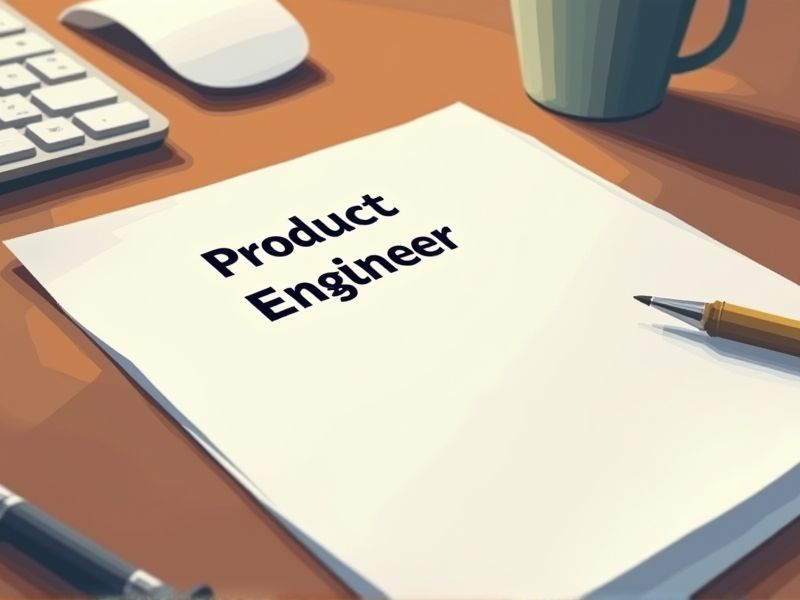
Product Engineers operate at the intersection of design, engineering, and business, requiring a comprehensive skill set. Certifications provide validation of expertise in areas such as quality systems, project management, and technical proficiency. They enhance credibility and demonstrate commitment to staying updated with industry standards. Here are some important certifications you may need as a Product Engineer.
Certified Product Manager (CPM)
The presence of a Certified Product Manager (CPM) ensures alignment between market needs and the technical capabilities developed by a Product Engineer. CPMs bring structured methodologies and strategic insights, aiding Product Engineers in prioritizing features that resonate with customer demand. Knowledge of business acumen and market trends from CPMs helps Product Engineers focus on innovation that drives revenue. There's effective cross-functional communication facilitated by CPMs, reducing inefficiencies and enhancing the product lifecycle management.
Certified Product Development Professional (CPDP)
A Certified Product Development Professional (CPDP) equips a Product Engineer with structured methodologies essential for efficient product development cycles. Possessing CPDP certification demonstrates mastery over industry standards, which can enhance an engineer's credibility and career prospects. The certification provides knowledge in cross-functional collaboration, crucial for navigating complex product ecosystems. Given rapid technological advancement, CPDP helps ensure that Product Engineers stay current with best practices and innovative techniques.
Six Sigma Green Belt Certification
Product Engineers often face challenges in maintaining quality and efficiency. Six Sigma Green Belt Certification equips them with problem-solving and analytical skills to enhance process improvement. The certification instills a data-driven approach, essential for identifying and reducing variance in product development. Employers value this credential, as it indicates a commitment to quality and operational excellence.
Lean Manufacturing Certification
Lean Manufacturing Certification strengthens a product engineer's ability to enhance process efficiency by eliminating waste. The certification equips engineers with methodologies to improve production workflows, leading to reduced costs. With lean principles, product engineers can better align manufacturing processes with customer value, increasing satisfaction and market competitiveness. The knowledge gained aids in fostering a culture of continuous improvement, essential for sustained growth and innovation in manufacturing.
Certified Scrum Product Owner (CSPO)
Certified Scrum Product Owner (CSPO) credentials can enhance a Product Engineer's ability to effectively communicate the product vision and priorities to the development team, fostering clearer direction and motivation. Training in Scrum methodologies equips Product Engineers with skills for better backlog management, resulting in more organized and efficient workflows. Understanding Scrum roles and responsibilities through CSPO certification can lead to stronger collaboration and fewer project delays. Mastery of Scrum principles aids in iterative progress tracking that optimizes product delivery and user satisfaction.
Agile Certified Practitioner (PMI-ACP)
The Agile Certified Practitioner (PMI-ACP) certification equips Product Engineers with advanced knowledge of agile methodologies, enhancing their ability to adapt to rapid product iterations and changes in market demands. Possessing this certification often leads to more efficient collaboration within cross-functional teams, as it emphasizes communication and iterative development practices. Market trends indicate a growing demand for agile methodologies in engineering, making this certification valuable for career advancement and job security. Data suggests that professionals with agile certifications, including PMI-ACP, often report higher satisfaction with their ability to deliver projects effectively and meet stakeholder expectations.
Certified Quality Engineer (CQE)
A Certified Quality Engineer ensures that product engineering processes adhere to stringent quality standards, which reduces defects and enhances reliability. The CQE's expertise in quality control methodologies helps in optimizing production efficiency and minimizing waste, leading to cost savings. Their skills in statistical analysis and process improvement directly affect the development of products that meet consumer expectations and regulatory requirements. By addressing potential quality issues early, a CQE supports the product engineer in accelerating the time-to-market for new innovations.
Design for Six Sigma (DFSS)
Design for Six Sigma (DFSS) is crucial for product engineers because it integrates quality improvement from the initial stages of product development, reducing the risk of defects. By focusing on customer requirements and using data-driven approaches, product engineers can enhance product reliability and performance. This methodology facilitates better cross-functional collaboration, aligning various teams towards a common goal of product excellence. Implementing DFSS often leads to cost savings and efficiency gains by minimizing rework and ensuring quality at launch.
Project Management Professional (PMP)
Obtaining a Project Management Professional (PMP) certification equips a product engineer with structured project management skills, leading to more efficient project execution. This certification ensures that product engineers can effectively allocate resources and manage timelines, resulting in improved project outcomes. PMP knowledge enhances communication and collaboration skills, crucial for coordinating across different teams and stakeholders. Having a PMP credential often increases a product engineer's credibility and career advancement opportunities within the industry.
ISTQB Certified Tester Foundation Level (CTFL)
Acquiring the ISTQB Certified Tester Foundation Level (CTFL) equips a Product Engineer with standardized testing knowledge, enhancing the quality of product releases. This certification emphasizes foundational testing processes and methodologies, fostering a consistent approach to quality assurance across projects. By understanding these core principles, Product Engineers can better collaborate with test teams, ensuring comprehensive defect identification and resolution. Consequently, the CTFL certification leads to more robust and reliable product development, meeting customer expectations effectively.
Summary
When you earn certifications as a Product Engineer, your value to employers often increases due to enhanced expertise. These certifications validate your skills and can lead to more advanced project responsibilities. With demonstrated proficiency, you may find opportunities for career advancement and potentially higher salary prospects. Employers often view certified engineers as more credible, influencing team dynamics and project outcomes positively.
